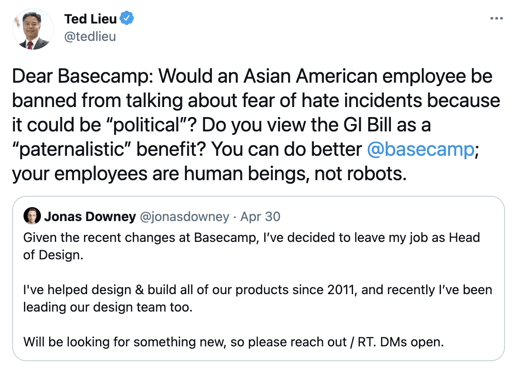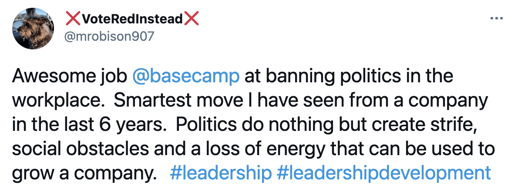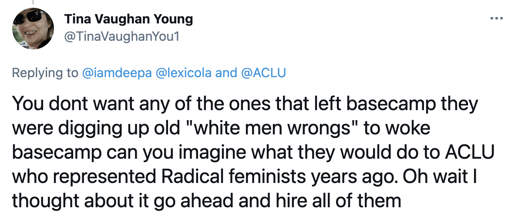We talked about politics in the workplace being a hot button issue in the past. In fact, in an episode of our video series – TribeTV, we shared these SHRM (Society of HR Management) stats…
“According to a recent survey from the Society for Human Resource Management, 42% of U.S. employees say they have personally experienced, and 44% say they have witnessed, political disagreements at work. Roughly 34% of respondents told SHRM that their workplace is not inclusive of differing political perspectives, and 12% said they have personally experienced political affiliation bias. A majority (56%) said that discussing politics at work has become more common in the past four years.
We also gave a list of reasons why you might want to dissuade political discussions in the workplace. In case you missed it, peek at the episode below.
CAN YOU TAKE GOOD ADVICE TOO FAR? UMM… MAYBE.
Well, it looks like a couple of companies have taken a hardline stance against politics in the workplace by taking matters to the extreme. Whether they are richer or poorer for it, time will decide. Basecamp is under a lot of scrutiny for their decision to ban political discussion from their workplace; a move inspired by Coinbase which did the same thing. Here is a basic timeline on what happened with Basecamp. (H/T to Recruiting Brainfood)
- Basecamp announces company is a politics free zone
- Online backlash ensues
- Online support arrives, prominently by Brian Armstrong CEO of Coinbase, who made a similar statement, to similar furor, earlier this year
- ‘There might be more to it’ exposé here
- Backlash gathers pace as 30%+ employees (of a 60 person company) accept pay out offers to leave if they are not happy with the new policy
THERE IS MORE TO THE STORY THAN POLITICS...
BUT POLITICS IS WHAT EVERYONE IS TALKING ABOUT
The Baseline story has been framed as a company banning all political discussion in the workplace and most of the online reactions have been based on that narrative. However, there is more to the story. In addition to the no-politics rule is a near censorship of employee voices and that may be the most damaging to Basecamp’s employer brand. More on that shortly, for now, let us consider the public’s overall response to the Basecamp controversy. The general feedback has been as partisan as the politics that spurred the action in the first place. Some are seeing the glass as half empty. For example, focusing on the costs of losing so much technical talent at once.
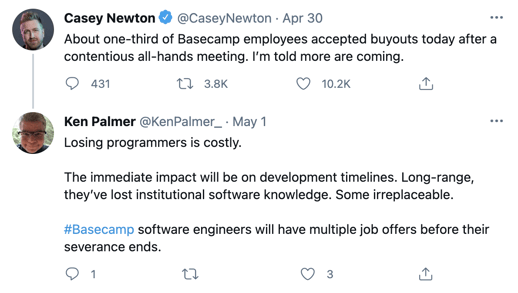
And to their point, some companies have taken advantage of the Basecamp controversy to acquire them. A few examples below.
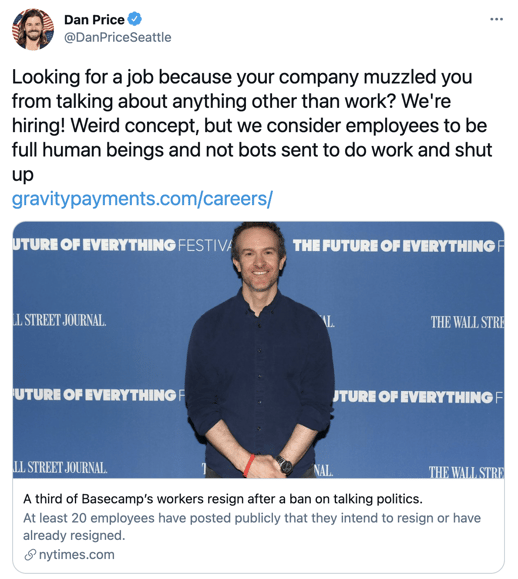
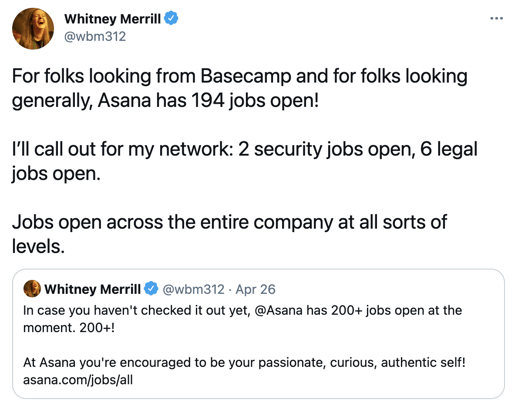
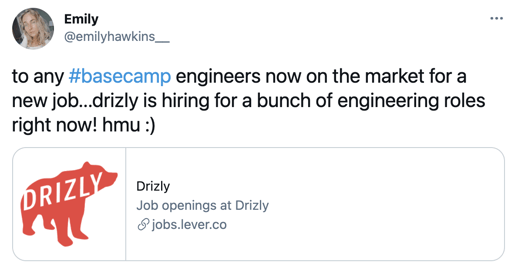 Others have taken it upon themselves to shame the company for perceived bias. Case in point…
Others have taken it upon themselves to shame the company for perceived bias. Case in point…
On the opposite side of the issue, the move by Basecamp has been praised. Case in point…
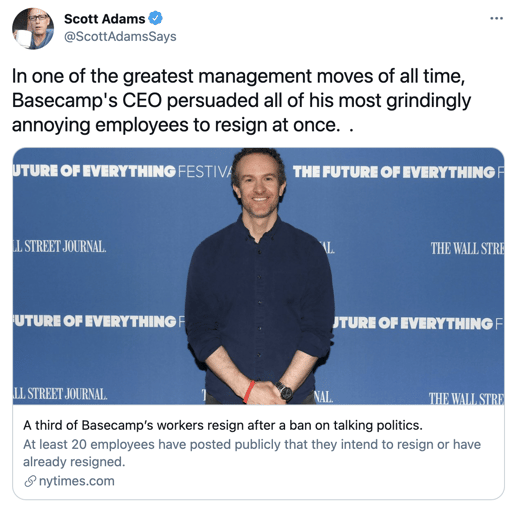
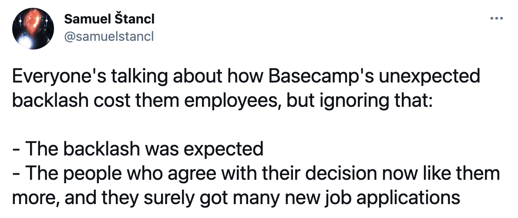
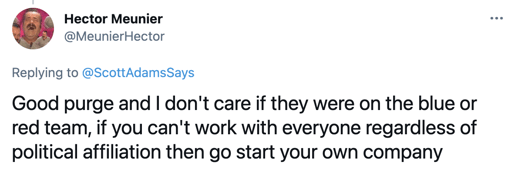
And while some support the workers leaving, others see hiring those workers as a red flag to employers who might be welcoming political strife into their orgs.
As I said, the conversation is deep, ever widening and not restricted to Twitter. Here are more comments from Reddit commentators; pro and con.
MORE COMMENTS ON BASECAMP AND COINBASE FOR THE CURIOUS…
Reddit Thread on this issue caused the moderator to shut it down. The moderator posted this...
“I'm sick of the reports from this thread so I'm locking it. Just like the past year, the vocal few ruin it for the majority. Impossible to have an honest discourse when people immediately start name calling and acting like fiction is truth.”

COMMENTS THAT WERE FOR POLITICAL DISCUSSION BANS IN THE WORKPLACE:
- “…Coinbase did same thing few months ago. Some people complained and Coinbase offered them severance and leave the company. Some people left the company. But, majority of people just went about their work. Coinbase went forward with their IPO and is now worth $100 Billion market cap.” Source: Reddit
- “This is the challenge that I think they're going to run into, and it's going to be incredibly difficult. I can sympathize with or even support the idea that you should be able to go to work without somebody preaching their politics at you, in the same way that religious proselytizing is unwelcome in the workplace. It can be uncomfortable to the point of harassment, and often the aggressor genuinely doesn't feel like they are crossing lines. It's better for everybody to firmly stomp down on such behavior.” Source: Reddit
- Try bringing your real self to work and see what happens if you have actual radical politics. I'm not talking about being the left wing of a center-right wing party (the Democrats) I'm talking about if you're an actual Marxist, communist, or industrial union member. You'll be fired or PIPed before you know it. Source: Reddit
- More over I'm glad that some companies have made this decision: it makes it easy for me to avoid employment there. Source: Reddit
- “…I also see why they wouldn't use the company's official profile to post political messages. The incentives just aren't there. If you make yourself a reputation of a company for posting "social good" messages you end up in a no win situation. The message will probably be not quick enough, not strong enough, or not sincere enough by virtue of being a company. Best, just to not play the game.’ Source: Reddit
- “To me that’s a lot different than discussing issues related to gender, race, lgbtq, diversity in the workplace, etc. but if it’s irrelevant to the job or if it’s having a negative impact on morale or cooperation, I can see why companies want to limit it. You’re there to do work for them after all.” Source: Reddit
- I like it. I'm into politics and I love constructive political conversations. But I just don't trust the vast majority of people to have political conversations constructively at work. Political discourse on the internet is highly polarizing and way too much about us vs. them and shaming and silencing views you don't like. If your position is so obviously correct, why does anyone think otherwise? If you don't come into the conversation with an open mind and some modesty, how can you expect that from your counterpart? Source: Reddit

COMMENTS THAT WERE AGAINST POLITICAL DISCUSSION BANS IN THE WORKPLACE:
- “How are companies not organizations of social change by definition? They make the social world we live in: what we buy, what we drive, what we live in, how we communicate.” Source: Reddit
- “I find a lot of social justice laundering corporations do to be superficial and very cynical, but I'd never work at a company that took an explicitly anti-politics stance. That's insane. I'm trans and my ability to exist at a company is predicated on politics. Sorry, that's just table stakes for me, and I'm more privileged than most. I would prefer to work at a smaller company where politics aren't the focus, because everyone shares a similar set of values and understands what's up. I'm not a developer to be an activist, and I'm definitely happier in a more transactional role, but I still need and value the support of my coworkers.” Source: Reddit
- The entire post comes off as "we no longer have the capacity to care". No more 360 reviews (i.e. we don't want constructive criticism flowing up) Shutting down the DE&I committee that apparently never got started. A disingenuous subtext that employees spend more time on social issues than work. These are general issues that don't speak to great organizational health or safety. I appreciate their honesty but I would decline an offer at BaseCamp based on this. Source: Reddit
- Yeah. My org wears it on their sleeve. We're very pro human rights. And I think that's a better way to phrase it. Just because something is a topic debated by politicians doesn't make it politics. Things like black lives or LGBTQ+ rights are things that I don't believe should be up for debate. Nor climate denial or covid denial. These are human rights and public health matters and I'm not going to be comfortable sitting next to someone who disagrees. And I don't think it matters that it may be close to half the country. I'm not willing to meet in the middle on those. It's not just a personal opinion when it so strongly affects people's lives. Source: Reddit
- It's like people think we work in a vacuum and work has no connection to social politics. In reality social politics is inherently embedded into everything we do whether we choose to acknowledge it or not. Source: Reddit
- I try very hard to keep politics out of the workplace, and have even advocated for tolerance from my coworkers when I’ve seen them being overly aggressive when criticizing opposing viewpoints. But there are some areas where there is a clear right and wrong, and these companies are abdicating responsibility in the name of profit. Which is their right, but it’s my right not to work for them. I already won’t work in certain industries and for certain companies; this just adds two more to the list. Source: Reddit

I THINK COMPROMISE IS THE KEY, NOT KILLING THE CULTURE
The lead in every story concerning Basecamp seems to come from this quote on their blog.
No more societal and political discussions on our company Basecamp account. Today's social and political waters are especially choppy. Sensitivities are at 11, and every discussion remotely related to politics, advocacy, or society at large quickly spins away from pleasant. You shouldn't have to wonder if staying out of it means you're complicit, or wading into it means you're a target. These are difficult enough waters to navigate in life, but significantly more so at work. It's become too much. It's a major distraction. It saps our energy, and redirects our dialog towards dark places. It's not healthy, it hasn't served us well. And we're done with it on our company Basecamp account where the work happens. People can take the conversations with willing co-workers to Signal, Whatsapp, or even a personal Basecamp account, but it can't happen where the work happens anymore.
Of course, that’s real clickbait material (as evident by the rants and raves all over social media) but there are some other matters worthy of note. Not too long ago, Basecamp wrote the book on the ideal company culture – literally. Their book “It Doesn’t Have to Be Crazy at Work” has a 4.5 star rating on Amazon and earned reader comments like this…
Anyone running small but successful businesses, especially those who care more about employees' welfare than the bottom line, may appreciate Fried and Hansson's practical, plainspoken advice.
-- "Library Journal"
Now, Basecamp is dismantling its own culture; something that goes beyond politics. When promoting their book, Basecamp CEO Jason Fried and CTO David Heinemeier Hansson were quoted in MagazineUS.
Company perks such as free dinners for people who work late, game rooms and free beer on a Friday may sound appealing, but these all create one problem: it makes you stay in the office. Fried calls these "gotcha’ benefits," which Basecamp actively avoids.
Instead, it invests in activities that benefit employees’ lives and, in turn, benefit Basecamp by having happy staff. That means paying for their holidays, giving people money to spend on a wellness activity, whether that’s yoga or buying a bike, and paying for a massage each month – at an actual spa, not in your chair at work – among other perks.
“We’ll send people to amazing places and what’s great is that it’s not just a vacation but an experience they may not have taken on their own,” Fried says. But the company doesn’t do it for applause. “We do it because it feels right,” he concludes.
Now, that perk is no more. In the now infamous blog post, they also announced the dismissal of “paternalistic” benefits.
No more paternalistic benefits. For years we've offered a fitness benefit, a wellness allowance, a farmer's market share, and continuing education allowances. They felt good at the time, but we've had a change of heart. It's none of our business what you do outside of work, and it's not Basecamp's place to encourage certain behaviors — regardless of good intention. By providing funds for certain things, we're getting too deep into nudging people's personal, individual choices. So we've ended these benefits, and, as compensation, paid every employee the full cash value of the benefits for this year. In addition, we recently introduced a 10% profit sharing plan to provide direct compensation that people can spend on whatever they'd like, privately, without company involvement or judgement.
What is also relevant to note is the dissolution of DEI initiatives from committee to a single person with any moral quandries to be decided by the founders.
No more committees. For nearly all of our 21 year existence, we were proudly committee-free. No big working groups making big decisions, or putting forward formalized, groupthink recommendations. No bureaucracy. But recently, a few sprung up. No longer. We're turning things back over to the person (or people) who were distinctly hired to make those decisions. The responsibility for DEI work returns to Andrea, our head of People Ops. The responsibility for negotiating use restrictions and moral quandaries returns to me and David. A long-standing group of managers called "Small Council" will disband — when we need advice or counsel we'll ask individuals with direct relevant experience rather than a pre-defined group at large. Back to basics, back to individual responsibility, back to work.
There is also a mention of an end to 360 reviews and a re-dedication to the purpose of the company that circumvents the politics of the day.
We don't have to solve deep social problems, chime in publicly whenever the world requests our opinion on the major issues of the day, or get behind one movement or another with time or treasure. These are all important topics, but they're not our topics at work — they're not what we collectively do here. Employees are free to take up whatever cause they want, support whatever movements they'd like, and speak out on whatever horrible injustices are being perpetrated on this group or that (and, unfortunately, there are far too many to choose from). But that's their business, not ours. We're in the business of making software…
And this is where, I think, things get truly interesting. On any given day, politics are subject to the wind. Take for example the George Floyd protests. The public demanded justice and the employees of large corporations were among them. It was not only the right thing to take a stand against injustice, it was also trendy and a means of virtue signaling. It is this underlying need to appear good and just that lures some corporations to go the extra mile with their corporate social responsibility. Yet, this can be a double-edged sword. When companies take up social causes to be seen but do not really believe in them, they end up harming their consumer brand. Go too far and your recruiting efforts become stymied by public opinion and ever-increasing denouncements by disgruntled employees on Glassdoor and other employee review sites. Long story short, companies should stand by the cultures they create and face the consequences when they fall short. Here are some examples of enterprises that say one thing and do another.

LOVE CONQUERS HATE
BAE SYSTEMS was a major sponsor of LGBTQ Pride parades in the UK and on their website, they are quoted as showing overwhelming support for said community.
At BAE Systems, we are committed to advancing a culture of inclusion that values difference as a source of strength so that all employees may bring their whole selves to work.
As part of this commitment, we empower our diverse workforce to take action to expand understanding and build cultural competence. And one way we do this is through our employee-led Multicultural Network, which provides forums for networking and professional development, a platform for the open exchange of ideas, and offers opportunities to engage in community outreach activities across the US.
One employee resource group under this network is OutLink which represents our Lesbian, Gay, Bisexual, Transgender, Questioning (LGBTQ) and Ally employees. OutLink’s mission is to help create a respectful environment that supports LGBTQ employees and allies in feeling proud, integrated, and secure in the workplace.
Despite this, BAE Systems is the third biggest market for Saudi Arabia, a country in which homosexuality is punishable by death. As a result, the LGBTQ community has been actively protesting against BAE Systems which I imagine, hinders their recruitment efforts with that group.

CAN YOU GUESS WHAT NIKE & COCA-COLA HAVE IN COMMON?
Nike and Coca-Cola have both expressed commitments to the Black Community in America to address racial inequality and the injustice of systemic racism. Towards that end, Nike pledged $40,000,000.00 to Black Lives Matter and similar causes. That notwithstanding, in stark contrast to their core values of community and social responsibility, Nike factories rely on the forced labour of detained Uyghur Muslims in China. The Washington Post reported last year a factory affiliated with Nike is “equipped with watchtowers, barbed-wire fences and police guard boxes.” Coca-Cola has taken a similar tact with Nike in that they have also pledged financial support to combat racial injustice by announcing $2,500,000 in support of criminal justice reform grants as they recognize that “Companies like ours must speak up as allies to the Black Lives Matter movement. We stand with those seeking justice and equality.” And yet, like Nike, Coca-Cola has been involved in the exploitation of Uyghur Muslim workers. Indeed, both Coca-Cola and Nike are lobbying to water down legislation that would ban products made with forced labor in China’s Xinjiang province.
These are just a few examples of corporations saying one thing and doing another. Many more violations could be cited from the Violation Tracker. The Violation Tracker is the first wide-ranging database on corporate misconduct. It covers banking, consumer protection, false claims, environmental, wage & hour, safety, discrimination, price-fixing, and other cases resolved by federal regulatory agencies and all parts of the Justice Department since 2000 -- plus cases from state Attorney Generals and selected state regulatory agencies. In all: 483,000 civil and criminal cases from more than 300 agencies with penalties of $667 billion.
This is some of what I saw when I tracked Starbucks. 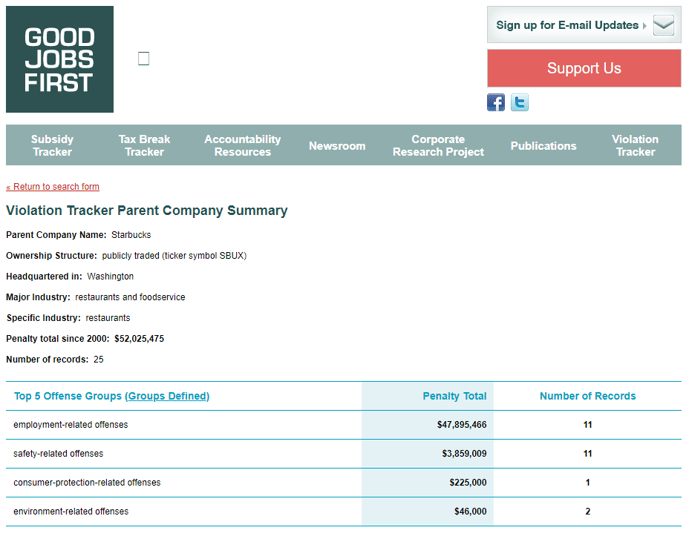
Bottomline, you cannot fake culture.
All that to say, I think the Basecamp culture controversy is a sign of a political pendulum swinging the other way. As employees become more WOKE and demand that their employers follow their lead, the more employers are going to push back if it interferes with the bottom line in a significant way. What’s most important is finding a way to compromise without sacrificing your integrity. Companies who are true to their core values will not sway with the times but instead double down in what makes them special. The end result will be a more resonant authenticity that attracts the talent they want while repelling those who may actively try to change it into something else. If you are indeed concerned with matters of social justice, it should come as no surprise to anyone if you act along that wise. It should not be something “new” in reaction to a recent occurrence in the news. It should be something you do when no one is watching you except the employees who stand alongside you. Does Colonel Sanders get accolades for a new chicken sandwich? Maybe, but it is not surprising to anyone because it's accepted as part of his brand. That kind of authenticity cannot be faked, no matter how much money you throw at it.
<< Click here for the free download: "Am I Society's Keeper? Corporate Social Responsibility in the Era of Wokeness" >>

